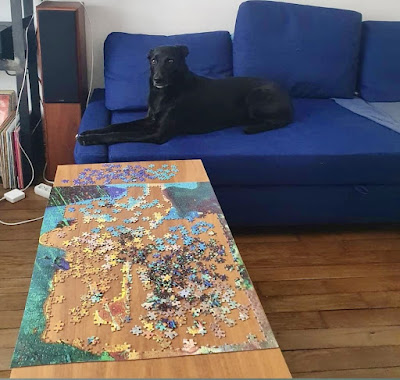Not Another Piece About How the Pandemic Has Distorted Our Perception of Time
It has been 283 days since I watched Emmanuel Macron announce that we were at war with a virus. Clutching a bottle of tepid beer and clenching my jaw, I heard the man in charge of the French army say the words "Nous sommes en guerre" six times. With each "sommes", the president's subtle lisp intensified. Each "guerre" pressed further home the seriousness of his hyperbole.
283 days is a long time. As Shon Faye recently pointed out, the first babies conceived during the pandemic have now been forced, against their tiny wills, into a world of anti-maskers, zoom fatigue, and daily death counts.
Since March, microscopic gametes have found the time to mature into full human babies, yet I feel like I have accomplished nothing. Where did my year go? How is it already December? I ask these questions out loud, to no one in particular, as I wait for the next online meeting.
I don't
know where my year went which is odd because time doesn't exactly fly during a
pandemic. At best it crawls laboriously, like a sloth on a concrete road. These past months, we have had nothing but
time. In April (or was it May?), I found myself compulsively calling all
my loved ones to make sure they still existed. I asked a friend how she was
feeling and she replied "Life is a never-ending sludge of time and
guilt".
Although I have formed new habits and adapted to this new reality, I have, like many others, refused to accept any of it as normal. I have never been able to rid myself of the illusion that the pandemic will simply and neatly stop. And so, I have been waiting.
Because I am always waiting, my brain does not seem to register most events as worth retaining. When I turn and look back, I struggle to place the year's moments in chronological order. In fact, there is nothing like a timeline, only a vague sense of before and after. Anything that took place during the first two months of 2020 lives in my mind at the end of a period that historians will come to know as the "long 2019". Anything that came after has dissolved into a now familiar time-and-guilt-sludge.
Events are no longer events; they are stages which lead towards the thing I am waiting for: an end to "all this". Everything I am feeling at the moment will later be boiled down in my memory into a single uniform block of impatience. I am not a neuroscientist, nor a philosopher (not really), but I think this is why time is both fast and slow at the moment.
I suspect that some of you have read this far because you were under the false impression that, as someone who knows Bergson quite well, I might have something fresh and insightful to say about the now very tired topic of time perception under lock down.
Bergson did have interesting things to say about time. He said that minutes on clocks were poorly executed snapshots of real time or durée. He described durée as time unconstrained by practicalities, as the purest form of our inner life, as an internal continuous flow punctuated by bursts of creativity. He encouraged us to "let our ego live", to experience our inner temporality, not as a succession of past and present moments, but as our present messily building upon our past and thrusting us forward, towards more and more freedom.
These ideas are beautiful (and explain why analytic philosophers don't take us continent-dwellers seriously). But nine months into a pandemic, I don't want to let my ego live anymore. In lock down, I have felt time stretch out so fast I almost missed it while simultaneously feeling its tension drop as it curled up into nothing.
I am sick of the impulsiveness of duration. I want my ego to be constricted and constrained by the reassuring structure of socially constructed time. I want to spend my socially constructed time with other egos, ideally in a cool Parisian bar, or at a gig, or in my grandparents' living room.
I hope I
don’t have to wait another 283 days.
The illustration is by Brett Helquist.




Wow...
ReplyDeleteA very good description of how this pandemic has been an experience of a miserable duration.
Two days ago I came across Megan Craig piece in the NYT (The stone)....Your writing reminded me of that....here is link:
https://www.nytimes.com/2020/12/21/opinion/time-coronavirus.html
Thank you for reading and what a great piece!
DeleteOver here in East London I was wondering how a Bergsonian might feel. Now I know. Thanks for colouring in that square for me.
ReplyDelete